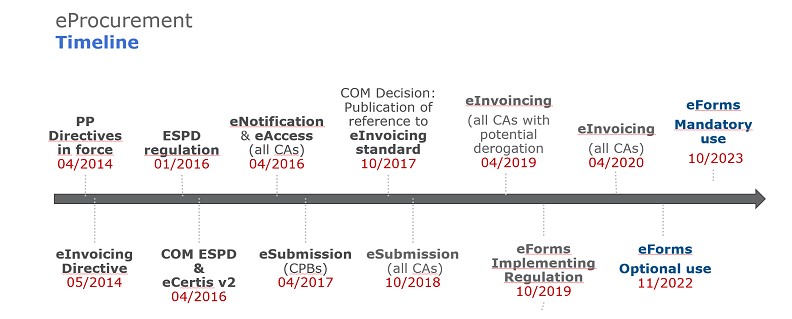ESPD and the decline of the PQQ
Contents |
[edit] Introduction
A pre-qualification questionnaire (PQQ, sometimes referred to as a supplier assessment questionnaire) sets out a series of questions for potential tenderers to answer regarding their level of experience, capacity and financial standing. The answers to these questions enable the client to produce a short list of suppliers that are likely to be most appropriate for their project. Using a pre-qualification questionnaire has the effect of reducing the number of potential tenders to those that are genuinely appropriate for the project, saving a great deal of wasted time for potential tenderers who would not have any realistic chance of winning the contract. It also saves time for the client processing and assessing inappropriate tenders.
Created under the EU 2014 Directive on Procurement, the European Single Procurement Document (ESPD) is used by both buyers and suppliers on public-sector contracts anywhere within the European Union. In submitting an ESPD, the supplier is providing a preliminary indication that their ability, suitability and financial status meet the stated conditions of the procurement process.This means they do not have to provide up-front documentary evidence and the assorted paperwork previously required to show they meet the public authority’s required criteria; they only have to provide such evidence when or if they are selected as the appointed contractor.
[edit] How the ESPD came into force
The ESPD is sometimes thought of as a less complex alternative to a PQQ. The self-regulatory nature of the ESPD allows suppliers to self-declare that they meet the minimum regulatory criteria or commercial capability requirements, and so allows them to progress to the next stage of the process.
Its adoption of ESPD followed different timelines across the UK.
England, Wales and Northern Ireland: On 26 January 2016 all public bodies were required to accept ESPD for all procurements above the EU thresholds under Regulation 59 of the Public Contracts Regulations 2015.
Scotland: On 18 April 2016 all Scottish public bodies were required to issue and accept the ESPD for all procurements worth more than the EU thresholds. This replaced the Scottish standard pre-qualification questionnaire (sPQQ) and any local PQQs used by public bodies.
[edit] Additional important dates
The ESPD’s digital implementation took place across Europe in 2017. The programme is now operating as an online eProcurement method supported by eCertis, a web-based tool that acts as the EU’s repository of certificates required for all public procurement across the EU. The use of paper versions of ESPDs was discontinued in 2018.
The name of ESPD has changed to the Single Procurement Document (SPD) in England; in Scotland, it is SPD (Scotland) There are no additional changes to how it operates.
For more information see: European Single Procurement Document.
[edit] Related articles on Designing Buildings Wiki
Featured articles and news
Key points for construction at a glance with industry reactions.
Functionality, visibility and sustainability
The simpler approach to specification.
Architects, architecture, buildings, and inspiration in film
The close ties between makers and the movies, with our long list of suggested viewing.
SELECT three-point plan for action issued to MSPs
Call for Scottish regulation, green skills and recognition of electrotechnical industry as part of a manifesto for Scottish Parliamentary elections.
UCEM becomes the University of the Built Environment
Major milestone in its 106-year history, follows recent merger with London School of Architecture (LSE).
Professional practical experience for Architects in training
The long process to transform the nature of education and professional practical experience in the Architecture profession following recent reports.
A people-first approach to retrofit
Moving away from the destructive paradigm of fabric-first.
International Electrician Day, 10 June 2025
Celebrating the role of electrical engineers from André-Marie Amperè, today and for the future.
New guide for clients launched at Houses of Parliament
'There has never been a more important time for clients to step up and ...ask the right questions'
The impact of recycled slate tiles
Innovation across the decades.
EPC changes for existing buildings
Changes and their context as the new RdSAP methodology comes into use from 15 June.
Skills England publishes Sector skills needs assessments
Priority areas relating to the built environment highlighted and described in brief.
BSRIA HVAC Market Watch - May 2025 Edition
Heat Pump Market Outlook: Policy, Performance & Refrigerant Trends for 2025–2028.
Committing to EDI in construction with CIOB
Built Environment professional bodies deepen commitment to EDI with two new signatories: CIAT and CICES.
Government Grenfell progress report at a glance
Line by line recomendation overview, with links to more details.
An engaging and lively review of his professional life.
Sustainable heating for listed buildings
A problem that needs to be approached intelligently.
50th Golden anniversary ECA Edmundson apprentice award
Deadline for entries has been extended to Friday 27 June, so don't miss out!
CIAT at the London Festival of Architecture
Designing for Everyone: Breaking Barriers in Inclusive Architecture.
Mixed reactions to apprenticeship and skills reform 2025
A 'welcome shift' for some and a 'backwards step' for others.



























